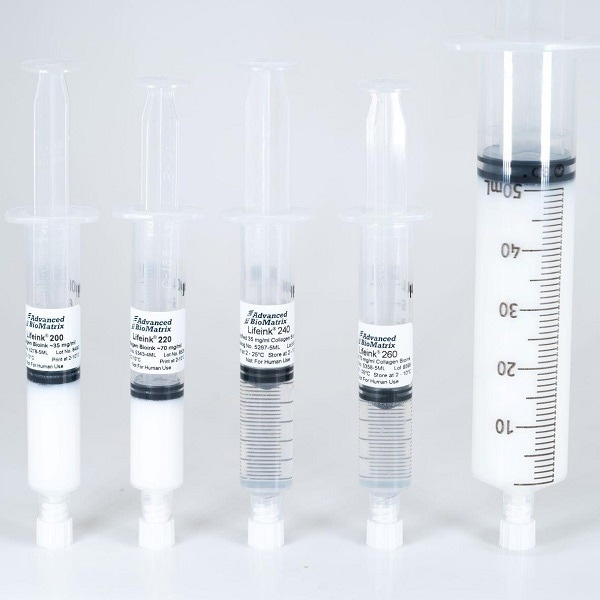Overview
Lifeink® 260 is known to be a 70 mg/ml type I collagen bioink that is available for extrusion-based FRESH 3D bioprinting.
Lifeink® 260 is available with acidic pH and when FRESH printed into LifeSupport® provides a neutralized, high-resolution collagen scaffold.
Lifeink® 260 is known to be an acidic Type I collagen bioink having a concentration of 70 mg/ml for extrusion-based 3D bioprinting. The product has been a highly concentrated acidified collagen solution planned to be extrusion printed employing FRESH bioprinting.
Lifeink® 260 generates printed structures along with a high print resolution and strong mechanical strength. The product has been formulated in an acidic saline buffer solution. As soon as the collagen is printed into LifeSupport®, the pH and salts concentration of the printed structure has turned out to be physiological.
Furthermore, cells could be seeded onto the printed structure enabling the 3D bioprinted structure’s cell adherence and cellular remodeling.
Add table
Image Credit: Advanced Biomatrix
Source: Advanced Biomatrix
| Parameter, Testing, and Method |
Lifeink® 260 #5358 |
| Sterilization Method |
Filtration, Aseptic Processing |
| Sterility - USP modified |
No growth |
| Form |
Clear Viscous Solution |
| Package Size |
4 mL |
| Storage Temperature |
2-8 °C |
| Print Temperature |
2-25 °C |
| Shelf Life |
Minimum of 6 months from date of receipt |
| Endotoxin - LAL |
≤ 10.0 EU/mL |
| pH |
3.0-5.0 |
| Osmolality (mOsmo H2O/kg) |
450-700 |
| Source Material |
Bovine Collagen |
| Electrophoretic Pattern - Coomassie Blue |
Characteristic |
| Collagen Concentration - Biuret |
65-75 mg/mL |
| Collagen Purity - Silver Staining |
≥ 99% |
| Continuous Flow Extrusion |
Pass |